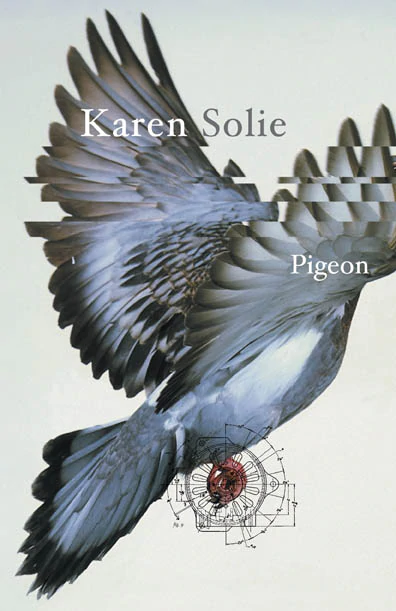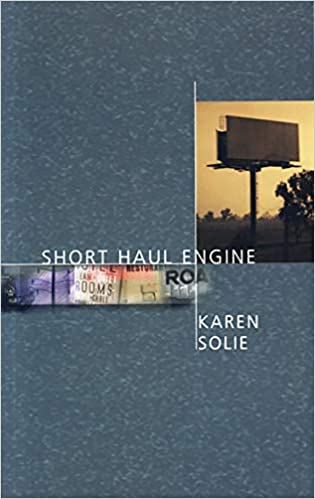
Karen Solie’s first collection of poems, Short Haul Engine, won the Dorothy Livesay Poetry Prize and was shortlisted for the 2002 Griffin Poetry Prize, the ReLit and the Gerald Lampert Memorial Award. Her second, Modern and Normal, was shortlisted for the Trillium Book Award for Poetry. Her poetry, fiction and non-fiction have appeared in numerous North American journals. She is a native of Saskatchewan and now lives in Toronto.


- 2010
- 2002
Judges’ Citation
Karen Solie’s first book of poems, Short Haul Engine – a nice phrase for poetry – stood out for its mix of physical impressions, perceptual strength, and – especially – mental grace.
Karen Solie’s first book of poems, Short Haul Engine – a nice phrase for poetry – stood out for its mix of physical impressions, perceptual strength, and – especially – mental grace. A kind of liveliness, agility, connectivity. In ‘Early in Winter,’ one of her many car poems, she writes: ‘feet cold, heart wagging its little tail.’ Grief shows: ‘what is not in everything/ there is; and all/ it wants to talk about/ is you.’ A monstrous old fish, a sturgeon, is hauled out of the water by some teenagers, but then, // when he began to heave and thrash over yards of rock/ to the water’s edge and, unbelievably, in,/ we couldn’t hold him though we were teenaged/ and bigger than everything. Could not contain/ the old current he had for a mind, its pull,/ and his body a muscle called river, called spawn.’
There is toughness here, as well as grace. Often in her pages, we encounter wisdom of a severity that we would almost rather not know. A cold person is a different species; there is a dismal companionship in grief, the water stays in the fish, even when the fish is out of the water. Short Haul Engine is not just an exceptional debut, it is an exceptional book.
Judges’ Citation
Among the greatest of Solie’s talents, evident throughout the poems of Pigeon, is an ability to see at once into and through our daily struggle, often thwarted by our very selves, toward something like an honourable life.
If virtue is love ordered and controlled,/its wild enemy has made a home in me. And if/desire injures the spirit, I am afflicted,’ says Karen Solie in one of Pigeon‘s finest poems, ‘An Acolyte Reads The Cloud of Unknowing.’ It’s this particular affliction of desire – and the corrosive effects of human desire both upon ourselves and the world we inhabit – that Solie most often meditates upon in poems as humorous, often, as they are sobering. ‘Gone are the bad old good old days. Before us,/vast unfenced acres of decline,’ she says in ‘Prayers for the Sick.’ Solie forces us to look squarely at that decline, the landscapes we’ve ruined, the vistas we’ve cluttered, in service to a longing that, as she puts it, ‘hovers like billboards/over the expressway.’ The vision here is powerful, philosophical, intelligent, especially adept at pulling great wisdom from the ordinary – as when a tractor is found to manifest ‘fate, forged/like a pearl around the grit of centuries.’ It may be, as Solie suggests, that ‘the honourable life/is like timing. One might not have the talent for it.’ Among the greatest of Solie’s talents, evident throughout the poems of Pigeon, is an ability to see at once into and through our daily struggle, often thwarted by our very selves, toward something like an honourable life.
Selected poems
by Karen Solie
It was the summer some rank fever weed
sunk her bitch hooks in, sowed my skin
to itch and ooze, that we shared a bed
for the first time. It’s not so bad,
you said, looking for a clean place
to put your hands while I stuck to the sheets
and stunk up the room with creams
and salves. You didn’t cringe,
(though in those days my back was often turned)
took your showers at the usual time, rose,
a bank of muscled cloud above
my poisoned field, and blew cool
across the mess. I said, eyes shining
with antihistamines, that you were potent
as a rare bird sighting, twenty on the sidewalk,
straight flush. It was only falling
into sleep that your body twitched away
from mine, a little more each time
I’d scratch, and I knew then we were made
for each other, that you lie as well as me,
my faithful drug, my perfect match.
Copyright © Karen Solie 2001
Anniversary
It seemed needlessly cruel
that I couldn’t coax even the hardiest,
homeliest, dullest of plants to grow
in the one west-facing window
of that place, with its air conditioner, sealed
with duct tape, that didn’t work,
and its mouse-hole, stuffed with steel
wool, that did. And an equally
needless kindness even more
unbearable, that unexpected flowering
inside the cheap circumference
of the pot while I was nearly
bedridden, of seeds borne on a broad wind
that flew in, and volunteered.
Copyright © 2009 Karen Solie
Geranium
Night blind through Rogers Pass,
engine popping like a rabbit gun
after an ambush of tunnels,
I brake for tinfoil, bottles,
dead stares of twisted deer.
This moon-shot boneyard
is a seam of eyes.
Immigrant rail crews lost
to the slides of March
a century ago. Two Japanese dug out
clasped in each other’s arms,
a Norwegian frozen in the act
of filling his pipe. No time
even to bruise.
Hidamo. Wafilsewki. Mitsumi. Sodiatis. Sanquist.
Bronze and marble statues
for the meat ride to Glacier Station.
And the whores who died cold,
full of holes, in clapboard Columbia
or the pockmarked skin village
of Golden. A drunken doctor drowned
in a puddle of horse piss.
Years later, slide shooters
and dozers shoved 92 miles of highway
through the Selkirks’ seismic muscle,
and now my four seizing cylinders
whine for a tail wind
to Saskatchewan. I Go All The Way,
Number One croons
over archival mutterings caught
in the black throat of the old Connaught Tunnel
buried at the Summit. Accordian ballads
of accidents that wait to happen
in the rock face, snow
fall, concentrated gravity of the gorge.
My odometer books odds of sleep
in hands and head. The cat knows it,
moving through luggage in the back seat,
throwing sparks.
Copyright © Karen Solie 2001.
In Passing
Above, blue darkens as it thins to an airlessness wheeling
with sparkling American junk
and magnetic brains of astronauts. We are flung
across our seats like pelts.
Some of us are eating small sandwiches.
Some of us have taken pills and are swallowing
glass after glass of gin.
We were never intended to view the curve of the earth
so they give us televisions, a film
about a man and his daughter who teach a flock
of Canada geese to fly.
Wind shear hates the sky and everything in it,
slices at right angles across the grain of currents
like a cross-cut saw.
Fog loves surprises.
We have fuel, fire, Starbuck’s coffee, finite
possibilities of machinery. A pilot with human hands
and nothing for us to do, turbulence being to air
what hope is to breathing.
A property.
Far below, a light comes on in the kitchen of a farmyard
turning with its piece of the world into shadow.
Someone can’t sleep
an engine noise falls around the house like snow, vapour trails
pulled apart by frontal systems locked overhead
since high school. Imagines
alien weathers that unfurl in time zones
beyond the horizon.
Copyright © Karen Solie 2001.
In-Flight Movie
for Cathy
Snow is falling, snagging its points on frayed
surfaces. There’s lightning
over Lake Ontario, Erie. In the great central
cities, debt accumulates along baseboards
like hair. Many things were good
while they lasted. Long dance halls
of neighbourhoods under the trees,
the qualified fellow-feeling no less genuine
for it. West are silent frozen fields and wheels
of wind. In the north, frost is measured
in vertical feet, and you sleep sitting because it hurts
less. It’s not winter for long. In April
shall the tax collector flower forth, and language
upend its papers looking for an entry adequate
to the sliced smell of budding
poplars. The sausage man will contrive
once more to block the sidewalk with his truck,
and though it’s illegal to idle one’s engine
for more than three minutes, every one of us will idle
like hell. After all that’s happened. We’re all
that’s left. In fall, the Arctic tern will fly
12,500 miles to Antarctica as it did every year
you were alive. It navigates by the sun and stars.
It tracks the earth’s magnetic fields
Sensitively as a compass needle and lives
on what it finds. I don’t understand it either.
Copyright © 2009 by Karen Solie, Pigeon (House of Anansi Press)
Migration
They stayed at home. They didn’t go far.
Trends do not move them.
From picture windows of family homes
they cast wide gazes of manifest pragmatism:
hopeful and competent, boundlessly integrated,
fearless, enviable, eternal.
Vegas, Florida, Mexico, Florida, Vegas.
With children they travel backroads
in first and last light to ball fields
and arenas of the Dominion.
We have no children. We don’t own,
but rent successively, relentlessly,
to no real end. The high-school reunion
was a disaster. Our husbands got wasted
and fought one another, then with an equanimity
we secretly despised, made up over
anthem rock, rye and water. Our
grudges are prehistoric and literal.
It seems they will survive us. The girls
share a table, each pitying the others their looks,
their men, their clothes, their lives.
Copyright © 2009 Karen Solie